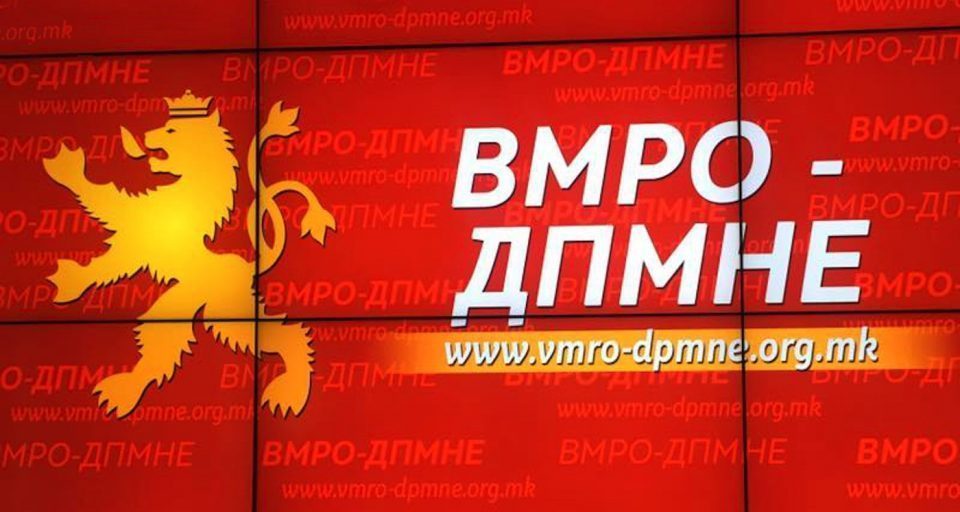VMRO-DPMNE strongly condemned the move by the Constitutional Court to discuss the case of the 2016 changes to the law on presidential pardons. According to the opposition party, this is driven by the need of outgoing Prime Minister Zoran Zaev to ensure he has the option to seek pardon from President Stevo Pendarovski, for the numerous criminal and corruption allegations raised against Zaev.
With its decision to open this case the Constitutional Court clearly showed that it is joining the rest of the judiciary in succumbing to the will of Zoran Zaev and the SDSM party which is currently in power. Is this the price we are asked to pay for Zaev’s selling of Macedonia? What he failed to accomplish through the amnesties he was offering through Parliament is now being completed through the Constitutional Court. VMRO-DPMNE calls on Zoran Zaev to stop pressuring the judiciary and to stop deluding the Macedonian public with new scandals, meant to distract from his crime and corruption, the opposition party said in a press release.
The Parliament seriously curbed the President’s right to give amnesties in 2016, after President Ivanov sought to put an end to the political crisis by giving mass pardons to politicians from all sides of the divide including Zaev and former Prime Minister Nikola Gruevski. Ivanov justified his move saying that the dozens of cases initiated by now thoroughly disgraced Special Prosecutor Katica Janeva are used to blackmail the political elite of the country to abandon its national interests and accept an unfavorable name change proposal from Greece. Retaliatory charges were filed by the OJO service of state prosecutors, against Janeva, and politicians from the SDSM party that backed Janeva, while Zaev was already charged for his part in the wiretapping scandal that provoked the political crisis (Zaev was also pardoned by previous President Branko Crvenkovski for corruption as Mayor of Strumica). Eventually, Ivanov gave pardons to all involved, saying that Macedonia needs to put an end to this type of politization of the judiciary.
This move sparked protests from SDSM supporters, which carried out some of the most violent protests of the Colored Revolution. Under international pressure, the Parliament was forced to adopt a law curbing the President’s power of pardon, and also opened an option under which a recipient of a pardon can ask the President to pull back his decision. All recipients did so, also under international pressure, and Ivanov’s pardons were revoked. The Constitutional Court is now hearing a challenge to these changes in the law which, if struck down by the court, will likely mean that Ivanov’s 2016 pardons are valid.
This would initially get a number of VMRO-DPMNE officials such as Gruevski who is in political asylum in Hungary off the hook. Zaev himself is currently untouchable before the courts, so he would not benefit in the short run. Conveniently for Zaev, this will settle his debt toward several VMRO officials who have since crossed over to his side, and supported the imposed name change in Parliament, such as former Culture Minister Elizabeta Kanceska Milevska, Vladanka Avirovic whose son was prosecuted by the SPO, Zekir Ramcilovic, whose political ally Sead Kocan is currently in prison on SPO charges and others. This is what VMRO-DPMNE is hinting at in its press release where they say that “what Zaev failed to accomplish through the amnesties he was offering through Parliament is now being completed through the Constitutional Court”. Zaev gave amnesties to three members of Parliament who were charged by OJO service of prosecutors in exchange for their votes, but people like Kanceska Milevska and Ramcilovic were still not repaid in full, since their cases and cases against those close to them were launched by the SPO prosecutors.
In the long run, though, Zaev and a long list of people around him are facing major corruption allegations, starting with the racketeering scandal which brought down Katica Janeva. Not a day goes by without some new report of corruption and abuse of office on the part of the Government. With Zaev expected to resign on January 3rd and facing uncertain prospects at the April 12th elections, he may find his immunity from prosecution about to expire very soon. In the meantime, SDSM won the presidential elections, and has a loyalist in Stevo Pendarovski holding the right to give away pardons, and reversing the law could help Zaev greatly in the future.
The court voted 6 to 3 to approve the examination of the 2016 amendments to the pardons law. The case will be put before the court next week.





Comments are closed for this post.